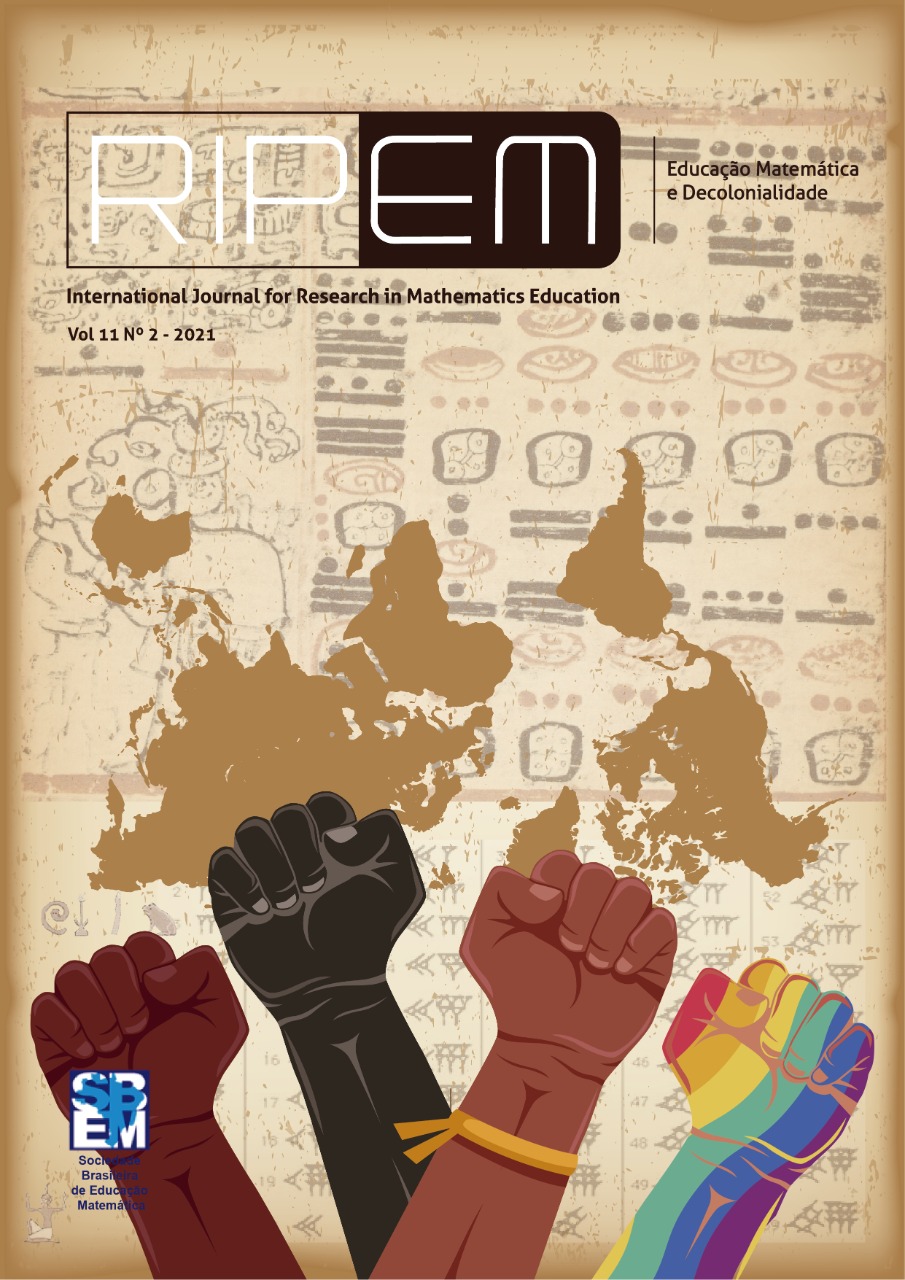From the LGBT + community to Mathematics classes: what interlocutions are possible?
DOI:
https://doi.org/10.37001/ripem.v11i2.2475Keywords:
Diversity, LGBT community, The struggle is pedagogical, Reading and Writing World with Mathematics, Critical Mathematics EducationAbstract
Mathematics classes have the power to promote social discussions and help students develop a critical view of the world. However, some themes have still had little space, even in the practices of teachers who aim to work in an inclusive perspective and with reflections on social justice. This article intends to reflect on how the LGBT + movement can contribute so that the struggles, stories and particularities of this community are more present at school. The engagement of mathematics teachers in the construction of a socio-political relationship with students is necessary for them to form critical citizens who respect and value differences.
Downloads
References
Adichie, C. N. (2019).O perigo de uma história única. 1 ed. São Paulo: Companhia das letras.
Barros, D. D. (2017). Formação inicial de professores de matemática na perspectiva da educação inclusiva: contribuições dadisciplina de Libras. 2017. Dissertação (Mestrado em Educação Matemática), Instituto de Geociências e Ciências Exatas – Unesp,Rio Claro/SP.
Brasil. (1988).Constituição da República Federativa do Brasil. BrasÃlia: Imprensa Oficial.
Brasil. (1994). Ministério da Educação. Secretaria de Educação Especial. PolÃtica Nacional de Educação Especial. BrasÃlia: MEC/SEESP.
Brasil. (2001). Ministério da Educação. Secretaria de Educação Especial. Diretrizes Nacionais para a Educação Especial na Educação Básica. BrasÃlia: MEC/SEESP.
Brasil. (2008). Ministério da Educação. Secretaria da Educação Especial. PolÃtica Nacional de Educação Especial, na perspectiva da Educação Inclusiva. BrasÃlia: MEC/SEESP, 2008.
Ciwko, V. (2016). Sex talk on the carpet incorporating gender and sexuality into 5th-grade curriculum. In: Rethinking sexism, gender, and sexuality. Milwaukee: Rethinking Schools.
Freire, P. (1987).Pedagogia do oprimido. 17. Ed. Rio de Janeiro: Paz e Terra.
Freire, P. & Macedo, D. (2013)Alfabetização: Leitura do mundo, leitura da palavra.6. ed. Rio de Janeiro: Paz e Terra.
Grupo Gay Bahia. (2019).Relatório 2019: população LGBT morta no Brasil.
Gutstein, E. (2003) Teaching and learning mathematics for social justice in an urban, latino school. Journal for research in Mathematics Education,Reston, v. 34, n. 1, p. 37-73.
Gutstein, E. (2006).Reading and writing the world with mathematics: toward a pedagogy for social justice. New York: Routledge.
Gutstein, E. (2007). Connecting Community, critical, and classical knowledge in teaching mathematics for social justice. In: The Montana Mathematics Enthusiast. 2007. p.109-118.
Gutstein, E. (2016). A letter to those who dare teach mathematics for social justice. New York: Routledge, 2016. In: E. A. Silver & P. A. Kenney (Eds.) More lessons learned from research: Volume 2.
Routledge. (2018).The struggle is pedagogical: learning to teach critical mathematics. In: ICME-13. Monographs. Springer.
Instituto de Pesquisa Econômica e Aplicada (IPEA). (2015).Retrato das desigualdades de gênero e raça.
Louro, G. L. (2007). Pedagogias da sexualidade. In: LOURO, G.L. (Org.) O corpo educado. Belo Horizonte: Autêntica, p.7-34.
Pereira, C.F. (2017). Barreiras à ambição e à representação polÃtica da população LGBT no Brasil. Revista Ãrtemis, Vol. XXIV, nº 1, jul-dez, p.120-131.
Skovsmose, O. (2014). Um convite à Educação Matemática CrÃtica. Campinas: Papirus.
Tempel, M. B. (2016). Introduction. In: Rethinking sexism, gender, and sexuality. Milwaukee: Rethinking Schools.
Published
How to Cite
Issue
Section

This work is licensed under a Creative Commons Attribution-NonCommercial-NoDerivatives 4.0 International License.








